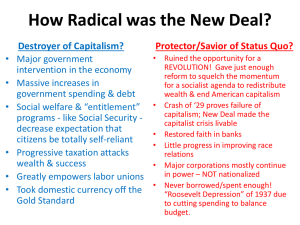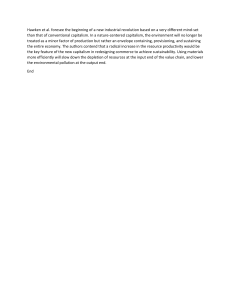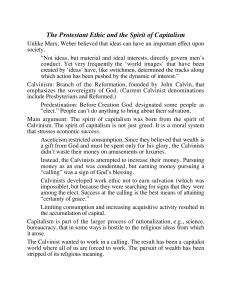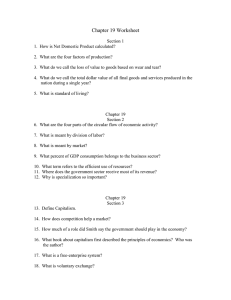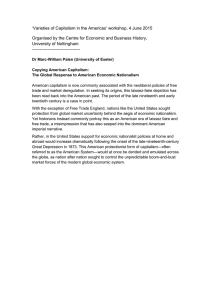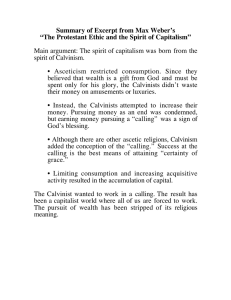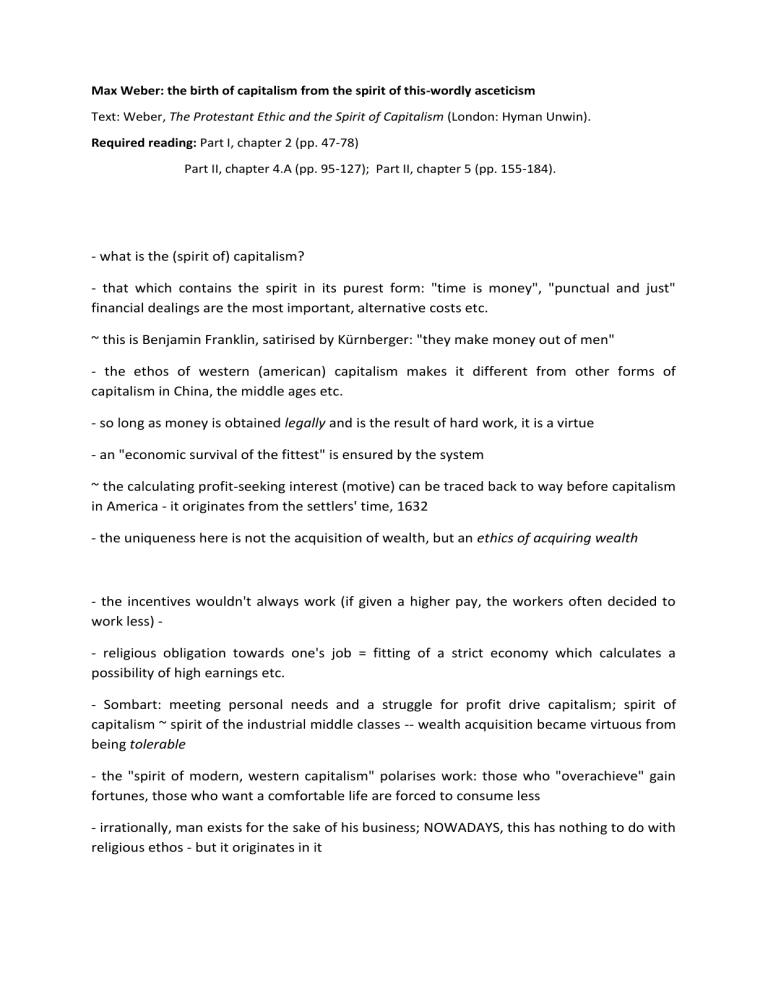
Max Weber: the birth of capitalism from the spirit of this-wordly asceticism Text: Weber, The Protestant Ethic and the Spirit of Capitalism (London: Hyman Unwin). Required reading: Part I, chapter 2 (pp. 47-78) Part II, chapter 4.A (pp. 95-127); Part II, chapter 5 (pp. 155-184). - what is the (spirit of) capitalism? - that which contains the spirit in its purest form: "time is money", "punctual and just" financial dealings are the most important, alternative costs etc. ~ this is Benjamin Franklin, satirised by Kürnberger: "they make money out of men" - the ethos of western (american) capitalism makes it different from other forms of capitalism in China, the middle ages etc. - so long as money is obtained legally and is the result of hard work, it is a virtue - an "economic survival of the fittest" is ensured by the system ~ the calculating profit-seeking interest (motive) can be traced back to way before capitalism in America - it originates from the settlers' time, 1632 - the uniqueness here is not the acquisition of wealth, but an ethics of acquiring wealth - the incentives wouldn't always work (if given a higher pay, the workers often decided to work less) - religious obligation towards one's job = fitting of a strict economy which calculates a possibility of high earnings etc. - Sombart: meeting personal needs and a struggle for profit drive capitalism; spirit of capitalism ~ spirit of the industrial middle classes -- wealth acquisition became virtuous from being tolerable - the "spirit of modern, western capitalism" polarises work: those who "overachieve" gain fortunes, those who want a comfortable life are forced to consume less - irrationally, man exists for the sake of his business; NOWADAYS, this has nothing to do with religious ethos - but it originates in it - the development of rationalism could explain the development of capitalism, but this rationalism itself is "based in an irrationality" - types of protestantism in history: 1) calvinism, 2) pietism, 3) methodism, 4) sects growing out of the Baptist movement - calvinism: predestination - man can not "free/convert" himself, his destiny is predetermined, grace is preordained -> unprecedented loneliness of the individual, elimination of salvation - (calvinism is inherently utilitarian); Calvin: all emotions are suspicious - how does one know who is determined for grace and who isn't? one has to believe one is; "the humble sinner" (Luther) -> "the self-confident saint" whose worldly economic activity counteracts religious anxiety; nothing can make one attain salvation, but one must demonstrate that he is one of the select few - the calvinist creates the conviction of his own salvation; the divine grace of the elect <-> the "sinfulness" of the neighbour whom God has not chosen - God as bookkeeper ~ the worldly bokkeeper is God's chosen - Bunyan: the sinner is to God that which the customer is to the shopkeeper - faith in valid norms + God as completely transcendental ------------------ possession results in the danger of relaxation -> only activity can serve God - labour is in the west an ascetic technique (<-> the orient): no time or interest in idle sexuality - puritan protestantism: Baxter; pragmatic, a "well-marked calling" (specialization) is needed, outside of which work is casual and irregular; there are no "transaction costs", the probability of sexual sin is thus smaller (~ a "religious" Adam Smith) - ascetism requires a methodical, systematic character; the focus is on a more useful "calling", not work itself - the more profitable work must be pursued, because if God requires more, more can be offered a thankfulness to God for being the "chosen people", man is a steward of his possessions ---> this FREED the acquisition of goods from the shackles of traditional ethics - book of Job - close to puritan thought; no play, no sports, no amusement... - ... exception: scientific endeavours; pedantic and highly trained - the uniformity of the life of puritans ----> the standardization of products in capitalism - a limitation of consumption is combined with a requirement of the acquisition of wealth --> the productive investment of capital is made possible - a problem foreseen by religious leaders: religious morals create business, which creates wealth, which eventually leads to "sin" and the destruction of religious morals "The power of religious asceticism provided [the capitalist] in addition with sober, conscientious, and unusually industrious workmen, who clung to their work as to a life purpose willed by God" the capitalist's belief: inequality = divine will and predestination; acquiring wealth = acquiring the certainty of grace - THIS is the cause of the "iron cage" of wealth and worldly possessions - the result: the convulsive self-importance of a mechanized petrification - the capitalist automaton doesn't require its religious roots any longer
